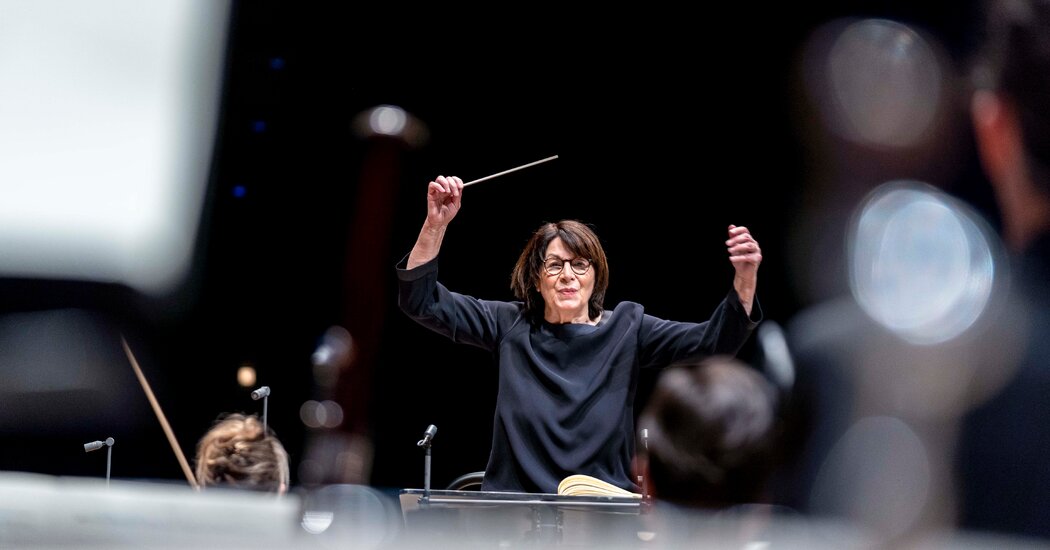
A Conductor’s Battle With a Classical Music Gender Barrier
03/07/2023This article is part of our Women and Leadership special report that profiles women leading the way on climate, politics, business and more.
The baton-waving bully conductor played by Cate Blanchett in “Tár” has earned a series of Oscar nominations and captivated audiences worldwide. That may be, in part, because of her novelty: Until recently, conducting was almost exclusively a male profession.
The French conductor Claire Gibault has spent a lifetime battling that gender barrier. In 2019, she co-founded La Maestra, a biennial international competition for female conductors in Paris that draws more than 200 contestants from some 50 countries.
“Giving confidence and visibility to the talented women who are emerging as orchestral conductors is a cause La Maestra will continue to champion with commitment and passion,” said a news release inviting contestants for the next competition, in March 2024. The competition, founded with the Philharmonie de Paris, awards prizes of 5,000 to 20,000 euros ($5,300 to $21,400) to finalists who are provided numerous musical opportunities, too. Ms. Gibault also founded the Paris Mozart Orchestra in 2011, one of France’s few female-led orchestras.
Born in 1945 and raised in Le Mans in northwestern France, where her father taught music theory at the conservatory, Ms. Gibault was studying violin when she discovered conducting and persuaded the conservatory to teach it.
She went on to make classical music history by becoming the first woman to conduct a performance at La Scala in Milan (where she was an assistant to her mentor, the late conductor Claudio Abbado, who was then La Scala’s music director). She also was the first woman to conduct the musicians of the Berlin Philharmonic Orchestra.
The Run-Up to the 2023 Oscars
The 95th Academy Awards will be presented on March 12 in Los Angeles.
Ms. Gibault, 77, has been busy and much in the news lately, especially with the Academy Awards on March 12. She discussed her career, her views on “Tár” and sexism in classical music in a phone interview from Paris. The conversation was translated from French, edited and condensed.
Why did you decide to set up the La Maestra competition?
In 2018, I was the only female jury member of a conducting competition in Mexico. There were such sexist attitudes on the part of certain jurors that I was shocked. One man on the jury even said that women were biologically incapable of being conductors, because their arms were naturally turned outward to hold babies. Whenever a female contestant came up in the competition, this man would cover his face with his jacket, close his eyes and plug his ears. One female finalist who was very musical and very talented received as many votes as a young man to whom the jury gave the first prize. I found that very unfair.
The competition in Mexico was a trigger for me. I was furious. When I got back to Paris, I met with a patron, Dominique Senequier, [founder and] president of the private investment company Ardian. I told her that a lot of female talents were invisible, and that it would be interesting to do something for them. She encouraged me to set up a prestigious competition for female conductors and said she would finance it.
What impact has the competition had?
The impact has been extraordinary. Female conductors are now viewed as a very modern phenomenon. Yet we have to be careful and very vigilant: make sure that it’s not just the young and attractive conductors who are being recruited. There is a flagrant degree of age discrimination in the world of classical music. For that to change, we need more women in management positions.
What was your own experience as a young female conductor in a profession with almost no women?
Audiences took it very well. The problem was the condescension of colleagues — of certain male conductors and of the male managers and directors of orchestras and cultural institutions. For them it was fine to hire women as long as they were assistant conductors, especially if they were very good assistants. I worked on pieces that the men didn’t want to work on, such as new compositions. I knew that this was a battle I had to wage with a smile, never complaining, never whining. That’s the way it worked.
Why did you set up the Paris Mozart Orchestra?
In my career, I experienced aggressive behavior on the part of musicians who made my job very hard, orchestras that didn’t want to play at my tempo. It was sometimes very difficult. I wanted to be able to choose the program. And I didn’t want to wait to be chosen.
What did you think of the movie “Tár”?
I found it disturbing, yet fascinating. What I like about the movie is that it’s a fable about power: how power can transform human beings, be they men or women. It’s like a Greek tragedy.
Did you feel that it was about you?
I don’t think we should be egocentric about it. It’s not because I’m a woman conductor that I felt directly concerned. It’s true that when you’re fighting for the cause of female conductors, it’s disturbing to see a woman who accumulates so many reasons to be hated: who takes advantage of her power, who takes drugs, who flirts with the young women in the orchestra. Of course, if a man behaved in that way, it would be a lot less shocking because we’re used to it.
That kind of male behavior in classical music is now being called out.
I think it’s high time for that behavior to stop. Not only is there abuse of power and sexual misconduct, but male conductors are also overpaid. That’s unacceptable given the economic crisis that the world of culture is going through.
You mean the pay gap between male and female orchestra conductors?
Yes, but also the pay gap with the musicians in the orchestra. And this incredible disdain that some male conductors have for the musicians that they’re conducting. We need to revolutionize this world from the inside. We need a different set of values.
What do you need to revolutionize?
The economics of culture. And the fact that careers are being built on notoriety, so the focus is on boosting people’s fame. There are people who are very famous and who are extraordinary artists, and others who are a little less so. I know extraordinary artists who are not famous at all.
So there’s a cult of personality?
Yes — for purely economic reasons.
Source: Read Full Article

